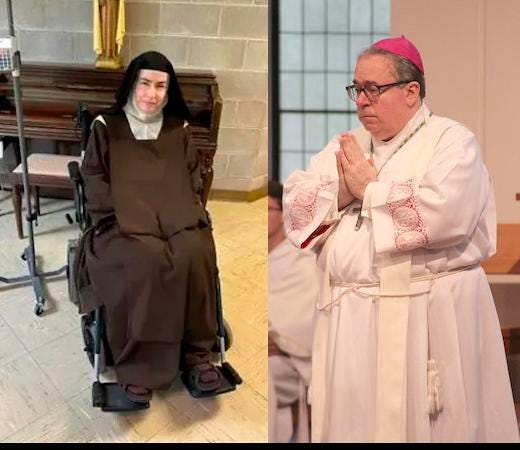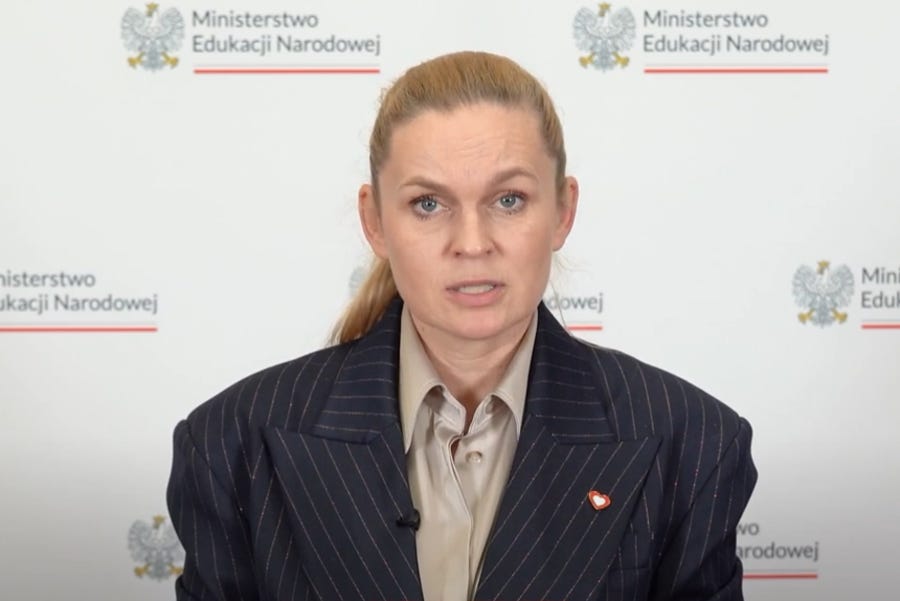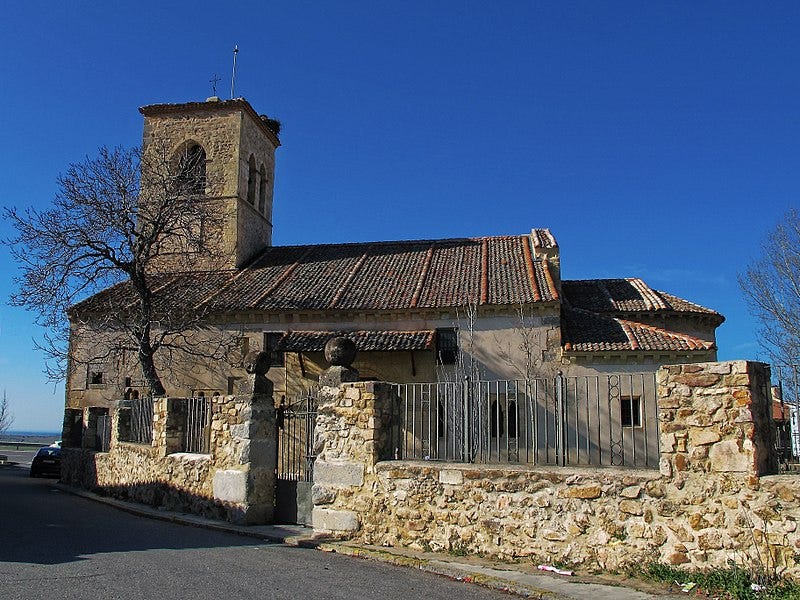Editor’s note: The Pillar’s editors, being sometimes incompetent at using their thumbs on their phone screens, mistakenly sent this report by email to all Pillar subscribers. Being committed not to inundate your inbox unexpectedly, and having done so anyway, we deeply regret the error.
This report was updated at 11:45 am ET to include a statement from the Diocese of Raleigh.
Bishop Michael Olson of Fort Worth was in a Texas courtroom Tuesday, arguing that a civil court has no jurisdiction to hear a lawsuit filed by Carmelite nuns in the diocese, who argue that their bishop defamed them, invaded their privacy, and stole information from their electronic devices, which were seized during a canonical investigation earlier this year.
During a hearing in Tarrant County’s 67th District Court, the Fort Worth diocese’s legal team played a tape of more than 30 minutes, in which Mother Teresa Agnes Gerlach could be heard being questioned by Bishop Olson, conceding that while she had an inappropriate sexual relationship with a priest, and insisting that it was “all over the phone,” and that the priest had not actually visited the Carmelite Monastery of the Most Holy Trinity in Arlington, Texas.
Also in the recording, Gerlach could be heard identifying the priest — Fr. Bernard Marie, whom she said was a member of a religious community with an unusual history — and whom Gerlach said she had met when the priest wrote to the monastery asking for prayers.
But that community said in a statement Wednesday morning that the priest is not actually a member, and is instead a diocesan priest who spent a “few months” as a novice in their Montana monastery.
Judge Dan Cosby told the courtroom that he wants to review evidence in the case before making a decision on the jurisdictional question.
But while the diocesan day in court answers some questions in a most unusual case playing out publicly, it also raises others — especially about the canonical case Olson has undertaken in the Carmelite monastery.
—
The audio tape played by the Fort Worth diocese June 27 was a record of an April conversation between Olson and Mother Teresa Agnes, whom Olson dismissed from religious life June 1, after he was appointed May 31 the “pontifical commissary” of the Arlington monastery by the Vatican’s Dicastery for Institutes of Consecrated Life and Societies of Apostolic Life.
In the recording, which was obtained by The Pillar June 28, Olson asked Gerlach whether she had committed a “violation of the Sixth Commandment … with a priest” and she assented to that.
But, the nun told Olson, “most of this was over the phone,” and later insisted that her contact with the priest was entirely over the phone.
As the bishop explained that he had initiated a canonical investigation, Gerlach told him: “Bishop, I need to tell you something. I don’t know how to explain this, but this did not happen in person. At all. It was all over the phone. So, he did not come down here,” Gerlach said.
“The truth is that he was not down here.”
Olson told her that she had “changed the story,” adding, “we have a hard time with the truth.”
Gerlach blamed her health problems, which had reportedly seen her heavily medicated in late 2022 and early 2023, and in the hospital for several medical procedures.
“I promise you, Bishop. At the time, I was having seizures, and I was really in a very difficult position. And I think my brain just got really messed up,” Gerlach insisted.
“And Bishop, I really got very confused,” the nun said on the tape. “I was not in my right mind.”
“Well, I understand it,” the bishop said, “even more so then, why you shouldn’t be prioress.” The bishop then read a decree initiating his canonical preliminary investigation of the nun.
Gerlach added that she and the priest got “very close,” and then indicated that, “just twice, on the phone,” they had committed some unspecified sexual sin “over the phone” or “on video chat.”
“I was not in my right mind when this happened … I would never do anything like this. I’m a nun, and … then you fall,” she told Olson.
The nun’s lawyer has previously said that his client’s supposed admission of sexual misconduct came while Gerlach was under the influence of fentanyl and other heavy medications.
In the hearing Tuesday, Father Jonathan Wallis, vicar general of the Fort Worth diocese, told the court that Gerlach had told him on three occasions in late December and early January that she had broken her vow of chastity in consensual acts with a priest from outside the Fort Worth diocese.
Wallis said that, on one of those occasions, Gerlach had expressed that she was “nervous about being late” — suggesting that the nun, 43, believed at the time she might be pregnant.
While Matthew Bobo, the nuns’ attorney, did not dispute that testimony, he did use his own questions to raise Gerlach’s health issues and to ask Wallis why he waited four months to report the nun’s alleged admission. The priest said he initially felt the nun should have addressed the issue herself within her own religious community.
The testimony seemed to paint a picture in which the diocese initially thought that Gerlach was involved in an ongoing, physical, consensual sexual relationship with a Montana priest, and that her later account to the bishop appeared to refute that.
But the testimony does not clarify what, precisely, Olson believed was the delict, or canonical crime, that Gerlach had committed.
While the Church teaches that sexual immorality is a grave sin, it does not establish that consensual sex between adults, even priests and religious, is usually a canonical crime — and while the diocese acknowledged that the unspecified sexual misconduct was consensual, Olson also approached it in the manner of a canonical crime.
In the audio tape, Olson himself acknowledged that “I know it’s consensual,” while adding that “a priest, as you know, is obliged to live his promises and vows, and it’s even more so for a priest even than a consecrated religious” — though Olson did not cite a theological or canonical principle for that assertion.
But the bishop was clear that he did not believe Gerlach was up to the task of her office as superior. After he read decrees opening a canonical investigation and restricting the nun’s life in the monastery, Olson emphasized his sense of the allegation’s gravity.
“Really, the sake of the whole Carmel is at stake here, you understand that. And I appreciate you telling the truth,” Olson said, while the nun insisted “I was in a really bad state.”
“I understand,” Olson said, “and that’s just a bad state for the burdens of leadership and judgment.”
Olson told Gerlach that her medical state had, in his view, disqualified her from leadership in the Carmelite community, and possibly from continuance in religious life, seemingly because her illness had impeded her capacity to exercise the office of prioress.
“The illness, to the point which you’re articulating now, has influenced your judgment so much as to lead you into objectively grave sin, twice, and so that shows you can’t maintain that office. And, see, and then there’s the question of the whole religious life as well. Because the canons are very strict on this,” Olson said, though it is not clear to which canons he was referring.
The bishop framed his decision to place Gerlach on “administrative leave,” with restrictions on her life in the monastery, as an opportunity for healing.
“Really the burdens of office and leadership are lifted from you right now.”
“I love you all very much,” he added in the tape. “There but for the grace of God go any of us.”
“But I don’t see a way you can return to being prioress,” he added.
—
A spokesman for the Diocese of Fort Worth told The Pillar Wednesday that the issue of marijuana use in the monastery also came up in the courtroom June 27. The diocese had previously released to media images from within the monastery showing a large quantity of marijuana products and paraphernalia.
“The matter of the drugs did come up,” Pat Svacina of the Fort Worth diocese told The Pillar.
“The bishop testified that three employees of the Carmel came to him with concerns about [Gerlach] because the bookkeeper had found receipts for items from an Arlington smoke shop, because they detected the smell of marijuana and saw the usual amount of prescription drugs.”
“The bishop testified that the diocese immediately reported the information and provided the photos to the Arlington Police Department. The diocese does not know the status of the Arlington investigation,” he added.
—
The priest whom Gerlach named in the tape was referred to as Fr. Bernard Marie; she said he was a member of the “Transalpine Redemptorist” monastery in Montana.
That community was founded in 1988, in association with the traditionalist Society of St. Pius X, which is in “irregular communion” with the Church.
But in 2008, the group — then 18 members including three priests — was reconciled in full communion with the Church, through the work of the Vatican’s Ecclesia Dei Commission.
While the group originally styled itself the “Transalpine Redemptorists,” they adopted the name Sons of the Most Holy Redeemer at the time of their reconciliation. In 2012, they were canonically erected as a clerical religious institute of diocesan right.
In 2020, the group purchased land in the Diocese of Great Falls-Billings, Montana and with permission of the bishop began constructing a monastery there.
But in a June 28 statement, the institute said that the priest identified by Gerlach was not a member of the community.
“The priest named in the evidence of Bishop Olson of Fort Worth, Texas, was at our house in Montana for a few months with the permission of his diocesan bishop, Bishop Zarama of Raleigh, North Carolina,” the statement said.
“As a novice, he was not a member of the Transalpine Redemptorist Religious Order. He was and remains a priest of the diocese of Raleigh. He was not engaged in public ministry.”
“He resigned as a novice and returned to his diocese on May 1st 2023.”
Shortly after the publication of this report, the Diocese of Raleigh sent The Pillar a statement in response to questions asked earlier.
The diocese, unprompted, named the priest directly.
“Fr. Philip Johnson is a priest of the Diocese of Raleigh who was granted leave from the diocese to serve as chaplain to a religious community in 2020 and who later joined the Transalpine Redemptorist Monastery in Montana in 2022,” the diocese said.
“He recently returned to North Carolina after resigning from the Redemptorist community where he served under the chosen name of Fr. Bernard Marie. Fr. Philip Johnson is not currently exercising public ministry. Upon returning to N.C. , Fr. Philip Johnson’s priestly faculties were restricted by Bishop Luis Rafael Zarama as a precautionary measure until more clarity regarding his status can be ascertained.”
According to the Raleigh diocese’s record of appointments, the monastery to which the priest was assigned in 2020 was a Carmelite Monastery in Traverse City, Michigan.
—
In addition to its civil lawsuit, the Carmelite monastery has reportedly filed several hierarchical recourses at the Vatican, which have challenged Olson’s interventions in the community, including an agreement enacted by the canonical advocate for the monastery appointed by Olson, which allowed the diocese to retain a copy of monastery electronic records.
To date, the dicastery for consecrated life has endowed Olson with authority over the monastery, and issued a decree overruling some challenges to the procedural validity of his decisions. Other appeals reportedly remain pending.
Correction: In one reference, this report originally indicated that Gerlach had named the priest as ‘Bernard Murray.’ This was a mistake — she identified him as ‘Bernard Marie,’ as noted in the later part of the report. The error has been corrected.




